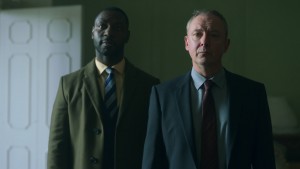In Part 2 of our exclusive phone interview with novelist/executive producer Peter James, he talks more about GRACE. The new British series, starring John Simm as Detective Superintendent Roy Grace, is streaming its two-telefilm first season on Britbox in the U.S.
ASSIGNMENT X: In DEAD SIMPLE, Roy Grace is assigned to the Cold Case unit, but winds up working on a current case. Is he working on cold cases or current cases throughout the bulk of the series?
PETER JAMES: Almost entirely, he’s working on current cases. There are a couple of books where his cold case knowledge comes in and links a long-past murder to a current perpetrator who’s resurfaced again. Because it is quite often you get that with a serial killer – they’ll stop offending for years, and then get married, have kids, and then they start again at some point later on.
AX: GRACE is a little like COLUMBO, where the audience knows who did it, and we watch the detective piece it together to confront the killer. Were you thinking of COLUMBO in working with the story structure you have?
JAMES: Yeah. I’ve always liked, if you like, the American style of thriller writing. The British tend to write very much in the style of Agatha Christie, where you have a dead body on Page 1, and the rest of the book is the puzzle to solve who did it. And the majority of American thrillers tend to have the victim alive and in peril at the end of Chapter 1, and it’s more about what’s going to happen than who’s done it. And that’s what I tend to write.
What I like best is – my publishers call it “the everyday sinister.” It’s bad things happening to a good, ordinary person. In DEAD SIMPLE, Michael [the kidnap victim] is a decent guy. He ends up being buried alive in a coffin. In the second one in the series, LOOKING GOOD DEAD, it’s a family man who commutes by train to London. He’s heading home, and then the guy next to him on the train is a complete d*ckhead, talking loudly on his cellphone, really annoying him. The d*ckhead finally gets off at his stop. And as the train pulls out, my main character looks down and sees there’s a memory stick that’s fallen out of the guy’s pocket. Being a decent guy, he wants to try and return it. So, he gets home, and he sticks it into his computer, hoping he can find the guy’s address off it. Instead, it leads him to a snuff movie, and the story develops on from there, and he ends up under threat, all from trying to do one good deed.
AX: Are there major changes between the books and the television series, in characters, or plot, or just things that changed because of technology? For instance, you probably wouldn’t have had a memory stick falling out of a phone in 2005 …
JAMES: In the novel, it was a CD that was left on the seat. We’ve had to upgrade all of that kind of technology. But in terms of the actual narrative of the stories, they are almost exact. The first change from the novel in the climax of DEAD SIMPLE was a car chase [in the book], because they wanted to bring Roy Grace more into being there at the resolution. But the basic story of that, and of LOOKING GOOD DEAD, and the way they’re mapping out the next season, are very, very faithful to the books. [TV series writer] Russell [Lewis] has always said, “The books work. I don’t want to do anything that changes that.”
I think [the TV adaptation of] DEAD SIMPLE very much caught the pace of the book. I love picking up a book that won’t let me put it down. And I try to write pretty much the way that I love to read. I tend to read, as many people do, at night. I’m in bed, and I’m tired. I love short chapters. If I pick up a book, and the chapter is fifty-three pages long, I go, “Oh, bloody hell. I’ll look at that tomorrow.” But if I pick up a book, and the third chapter is two or three pages long, and then the next thing is, “Oh, the next chapter is only one-and-a-half pages, oh, I’ll read that – oh, the next chapter’s only four pages.” And I’m still reading at three o’clock in the morning. I try to leave a kind of cliffhanger at the end of each chapter that makes you want to read on to the next chapter. And I think in Russell’s screen adaptation, he managed to really do that brilliantly. He got the high beats, and he got the kind of shocks [necessary] for making you curious to go on.
AX: In DEAD SIMPLE, Roy Grace consults a psychic. Does the psychic recur throughout the series?
JAMES: I didn’t want to make Roy Grace a “cranky” [eccentric] police officer. When his wife vanished off the face of the Earth several years earlier, and he has no idea what happened to her, whether she ran off, was she kidnapped, he tried everything, including going to psychics. So, that’s where he got his interest from. But it barely features in LOOKING GOOD DEAD, and then I don’t think in any more novels until the present time.
I was sitting next to a chief of police in Sussex, about twenty years ago, and I said, “Do police ever go to mediums, clairvoyants?” And he said, “More than you realize. Obviously, the press would rubbish [dismiss] it, but a good police detective, if he’s drawing a complete and utter blank, and somebody credible says, ‘I’m a clairvoyant, and I may be able to help you,’ you would be derelict in your duty to not at least follow that up. Maybe ninety-nine times out of a hundred, it comes to nothing, but just occasionally, it does.”
And I met a homicide detective who had actually got the address of a murderer he was after from a clairvoyant. So, he again said, “The hit rate may be one in a hundred, if that.” In England, you can still get into a lot of trouble [as a police detective who consults a psychic]. I know a New York detective, who I’m quite friendly with, and he regularly goes to psychics, but he’s quite psychic himself as well.
AX: Does Grace’s friend and colleague Glenn Branson, played by Richie Campbell, continue throughout the series?
JAMES: Glenn Branson is a major counterpart to Roy Grace throughout the entire series. He’s based on a real cop that I met back in about 1995. I was doing a lot of patrol with two cops. One was what we call in England “an old sweat,” a real old-school cop, approaching retirement. And there was a really young, energetic Black guy called Glenn Douglas. I asked, “How old are you,” and so on, and, “Are you getting a promotion any time soon?”, because he was still at the lowest rank, as a police constable. And he said, “Oh, I’ve only actually been in the force for a very short time. This is my first week out, in my probationary period.” And I said, “Really?” “Yeah, I was a nightclub dancer. And my kid was born, and I looked at him, and I thought, ‘One day, you’re going to go to school, and someone’s going to ask you what your dad does for a living, and I want you to be able to say something you’re proud of.’ And I decided to join the police.”
The kind of relationship that comes out in the books and I think will come out on screen, is that Roy sees in Glenn a potential for a really brilliant detective. And [he wants] a protégé, and they have this great rapport in the books. Glenn’s marriage breaks up, he ends up crashing on Roy’s floor, and ends up completely making a mess of Roy’s collection of vinyls [LPs]. They have this ongoing buddy relationship throughout the novels.
AX: Is there anything else that was changed between the GRACE books and the TV series, in terms of personality or procedure?
JAMES: Yes. Well, there’s a character called Norman Potting, played by Craig Parkinson, who comes into LOOKING GOOD DEAD, and he is an old-style, politically incorrect copper who actually, over the books, gets told off and does improve. Roy is the modern side of policing. I brought Norman Potting in to show a near-dinosaur who changes throughout the books. The cast is considerably more diverse than when I wrote the early novels, but I think that’s a really good thing, I think ITV have been very smart in reflecting the world of today, in 2021. It’s surely interesting – we’ve been watching the [Derek Chauvin] trial with fascination.
AX: And what would you most like people to know about GRACE the TV series?
JAMES: I would hope that they would find Grace a really engaging character. I would say only half in jest that if I’m ever unlucky enough to have a member of my family murdered, he’s the detective I’d want running the case. For people who like a really good, thrilling ride in a drama, the [episodes] are different – they are not the sort of classic, quiet police dramas that so often come out of England. [The telefilms of] GRACE are punchy roller-coaster rides, and I think people who watch them will have fun, and also learn stuff.
Follow us on Twitter at ASSIGNMENT X
Like us on Facebook at ASSIGNMENT X
Article Source: Assignment X
Article: Exclusive Interview: Novelist and executive producer Peter James on the Britbox series GRACE – Part 2
Related Posts:














